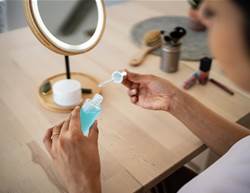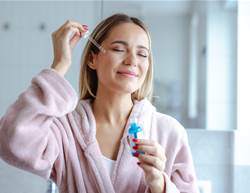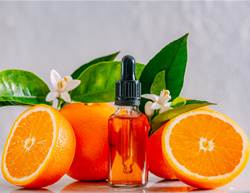With so many steps in your skincare routine to keep track of, it can be difficult to know what products to use and when. Skincare staples like vitamin C serums and retinols have a wealth of benefits for your complexion, but you may find yourself asking: can I use retinol and vitamin C together?
We’re taking the guesswork out of your regimen by asking dermatologists what the benefits of both products are and how you can use them simultaneously and safely. Here’s everything you need to know about including vitamin C and retinol in your routine for a glowing complexion, sans irritation.
What is retinol?
Retinol is a vitamin A derivative, or retinoid, related to Tretinoin (the active ingredient in Retin A), available in over-the-counter cosmeceuticals, says dermatologist Dr Heidi A. Waldorf. Retinol improves skin texture and colour caused by both ageing and photoaging. “It works by surface cell exfoliation, reduction of hyperpigmentation and improvement of collagen,” explains Dr Waldorf.
Retinoids are the single most effective component of a skin care regimen for prevention of signs of aging that is backed by science and research, says dermatologist Dr Corey L. Hartman. Retinols regulate cell turnover, promote effective exfoliation, prevent acne, even discolouration, control oil, smooth fine lines and wrinkles, unclog pores and so much more, he adds. “My opinion is that with the exception of people with rosacea or overly sensitive skin, everyone should be using a retinol.”
What to look for in a retinol
Look for longstanding, reputable brands that have clinical research behind their products, or speak with your dermatologist for their recommendation on which retinols to choose, suggests Dr Hartman. “Generally, I recommend patients look for a retinol with at least a concentration of .25% or .5% so that they can start to work it into their routine and see results. Anything less than .25% won’t be effective.”
Retinol is sensitive to air and light and will break down over time if routinely exposed to them, notes Dr Hartman. “Retinols should be kept in an opaque, air-restrictive bottle or pump container, especially if the product contains a higher percentage of retinol.”
What is vitamin c?
Vitamin C is an antioxidant that helps reduce inflammation caused by environmental stressors like sun exposure and pollution, explains Dr Waldorf. Vitamin C also aids in reducing hyperpigmentation and dark spots caused by acne scarring or sun exposure, notes Dr. Hartman.
Research has also shown that vitamin C helps stimulate collagen production, which makes skin appear firmer and reduces the appearance of fine lines and wrinkles, Dr Hartman adds.
What to look for in a vitamin c serum
Look for L-ascorbic acid, as this form of vitamin C has the most skin-related research of any form of vitamin C, says Dr Hartman. “When properly formulated at a pH of less than 4 (2.6-3.2 is the ideal range), this form helps create younger-looking, firmer-feeling skin while fading signs of uneven skin tone and spots.”
Just like retinol, vitamin C is sensitive to air and light and will break down over time if routinely exposed to them, notes Dr Hartman. “For optimal performance of your Vitamin C serum, it should be in an opaque, air-restrictive bottle or pump container to help ensure the ingredients remain stable.” A vitamin C cream that comes in a jar, unfortunately, won’t remain effective for long.
Can you use retinol and vitamin C together?
Patients can use vitamin C and retinol together in their overall skincare routine, says Dr Hartman, “and in fact, I recommend to all of my patients that they always use retinol, antioxidants and sunscreen in their skincare routine.”
Retinol and vitamin C work together incredibly well to not only protect your skin, but also help reduce signs of premature skin ageing, like fine lines, wrinkles and hyperpigmentation, says Dr Hartman. However, “I don’t recommend using them at the same time — try your retinol during your evening skincare routine and a vitamin C product during your AM skincare routine.”
Dr Waldorf agrees, noting that retinol and vitamin C can be used together, but she “generally prescribes antioxidants for daytime — to add to the protection provided by sunscreen — and retinol at night — when there’s no ultraviolet [exposure].”
What to know before using retinol and vitamin C together
Using both retinol and vitamin C in your skincare routine can help expedite the process in which the skin appears brighter and more even-toned, explains Dr Hartman. Still, keep in mind that both ingredients can be irritating, so it’s important to choose products with improved tolerability — often with a more moisturising base or gradual release of the active ingredients, suggests Dr Waldorf.
You also want to be sure to space the products out and not use them back to back in your morning routine. “I don’t advise using retinol and vitamin C in the same AM or PM skincare routine, as they are both powerful ingredients, which when together, can irritate the skin,” explains Dr Hartman. It’s easy to separate them, so doing so will ensure you get the maximum benefit without risking irritation, he adds.










